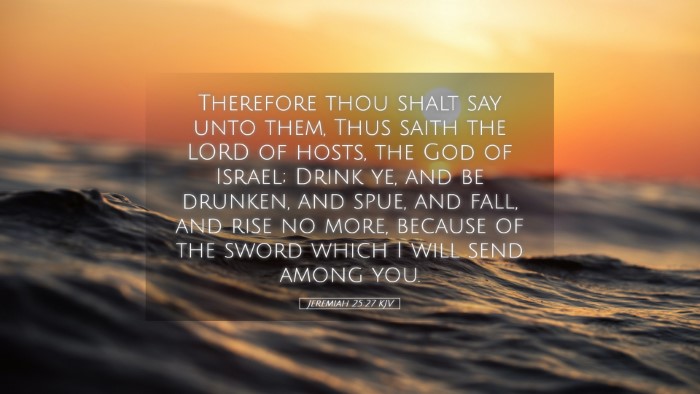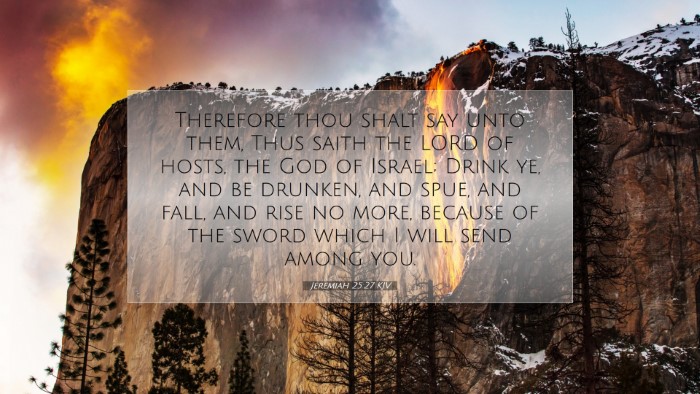Commentary on Jeremiah 25:27
Verse: "And thou shalt say unto them, Thus saith the Lord of hosts, the God of Israel; Drink ye, and be drunken, and spue, and fall, and rise no more, because of the sword which I will send among you."
Historical Context
Jeremiah, known as the weeping prophet, delivered God’s messages during a tumultuous time for Israel. The book of Jeremiah is set during the latter parts of Judah's history, particularly before the Babylonian exile. By the time of this verse, the impending judgment brought by the Babylonians was near, and the people of Judah were facing the reality of their sins and the repercussions of their disobedience to God.
The Meaning of the Verse
This verse is often understood as God commanding His people to acknowledge the consequences of their actions. The metaphor of drinking until drunkenness symbolizes the overwhelming judgment that God is about to unleash. It illustrates not only punishment but also a state of helplessness that results from their rebellion.
Key Themes
- Divine Judgment: The mention of the "sword" signifies the imminent destruction and violence that will come against the people due to their continued sinfulness.
- Spiritual Intoxication: The imagery of drunkenness portrays a state where clarity is lost. The people are warned that their unrepentant hearts will lead them to a point of no return.
- God's Sovereignty: This verse reinforces God's ultimate authority over nations and their fates, emphasizing that He is not merely reactive but actively orchestrating the destiny of His people.
Insights from Commentators
Matthew Henry
Matthew Henry elaborates on the gravity of the message. He suggests that God, out of His wisdom, employs stark and vivid imagery to convey the severity of His judgment. Henry notes that the command to “drink and be drunken” is an idiomatic expression that reflects the complete incapacitation of the people due to their sins. The drunkenness here symbolizes a refusal to face reality—a fitting description of the Israelites' spiritual condition.
Albert Barnes
Albert Barnes emphasizes the context of impending doom. He argues that this warning signifies that God was giving the people a chance to understand the fatal consequences of their actions. Barnes interprets the phrase “spue and fall” as a graphic depiction of the humiliation and despair that would result from their judgment. He points out the ironic nature of the verse: the people are instructed to drink deeply of God's wrath and realize the foolishness of their rebellion against Him.
Adam Clarke
Adam Clarke provides a thorough exploration of the implications of judgment. He notes that the “sword” refers specifically to the instruments of Babylonian conquest. Clarke highlights that the tone of despair in the verse reflects God's disappointment with a people who have repeatedly turned away from Him. He stresses that drunkenness is also indicative of spiritual lethargy—a condition that leads to inaction, making it difficult for the people to defend against coming judgment.
Theological Implications
This verse serves as a somber reminder for all who read it, especially for those in positions of spiritual leadership. It underscores the importance of heeding God’s warnings and understanding that persistent rebellion can lead to severe consequences. The theological implications are multifaceted:
- Repentance: It calls for an urgent response of repentance among believers. The danger of intoxication by sin can lead to spiritual blindness.
- Awareness of Judgment: The recognition that God’s justice is as real as His love is crucial for maintaining a balanced theological perspective.
- Hope Amidst Judgment: Although the message is one of impending doom, it serves as a pivot for future restoration, reminding that God’s ultimate plan includes redemption.
Application for Today
For pastors and theologians, Jeremiah 25:27 offers a rich ground for preaching and teaching. Here are some applications:
- Encouraging Repentance: Sermons can focus on the necessity of turning back to God in light of His dramatic warnings.
- Addressing Spiritual Apathy: Encouraging congregants to evaluate areas of spiritual numbness that may hinder their relationship with God.
- Assuring of God's Authority: Reinforcing the belief that God is in control, even in chaotic times, is essential for building trust in His plans.
Conclusion
Jeremiah 25:27 is a powerful proclamation that calls out to a people entrenched in sin while also providing a reflection on the consequences of rejecting divine guidance. It encapsulates the duality of God's nature—His righteousness and justice alongside His desire for repentance and restoration. In our contemporary context, engaging with this verse invites deep reflection on both personal and communal levels, urging us to remain vigilant against the spiritual intoxication that can lead us away from God.


